

Teachthough.com. Mimi Ito on Learning in Social Media Spaces (Big Thinkers Series) Mimi: So my question is this, why do we assume that kids' socializing and play is not a side of learning?
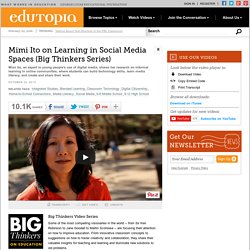
And on the flip side, why do we assume that schools can't have a spirit of entertainment and play as part of what they're doing? Mimi: Last year I wrapped up a three-year study with a large team of researchers where we were looking at a lot of different examples of kids' new-media practice, ranging from sort of everyday hanging-out behavior on sites like Myspace and Facebook with text messaging, IM to what we were calling more "geeked-out" kinds of participation, like making YouTube videos, remixing videos, creating podcasts, engaging in fan fiction, and other forms of fan production.
Mimi: I think our most important top-level finding was that there was tremendous diversity in what kids were doing online and what kids were learning online. Mimi: There really is a gap in perception and understanding between generations about the value of engagement with online activities. Digital Native vs Digital Citizen? Examining a Dangerous Stereotype. There are a lot of dangerous stereotypes out there.
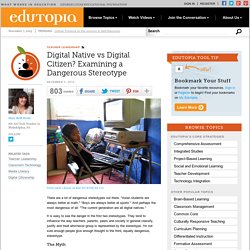
"Asian students are always better at math. " "Boys are always better at sports. " And perhaps the most dangerous of all: "The current generation are all digital natives. " It is easy to see the danger in the first two stereotypes. They tend to influence the way teachers, parents, peers and society in general classify, justify and treat whichever group is represented by the stereotype. The Myth There are many people I come in contact with on a regular basis who assume that any child under the age of 18, were they given a computer, would automatically know how to use it.
To add to the complexity, there are varying degrees of "using a computer. " Indeed, the OLPC experiment debunked the popular myth that students of this generation are "digital natives" because they grew up with computers and technological devices. Explicit Teaching. The Importance of Digital Citizenship in Social Media. There is an important scene in the movie Hoosiers during the team's first practice.
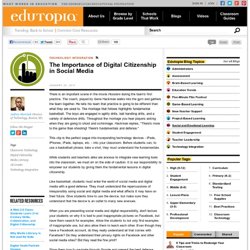
The coach, played by Gene Hackman walks into the gym and gathers the team together. He tells his team that practice is going to be different than what they are used to. The montage that follows highlights fundamental basketball. The boys are engaged in agility drills, ball handling drills, and a variety of defensive drills.
Definition Of Digital Citzenship. The Definition Of Digital Citizenship by Terry Heick As more and more students interact digitally–with content, one another, and various communities–the concept of digital citizenship becomes increasingly important.
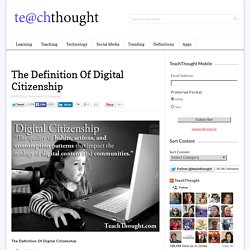
Which begs the question: what is digital citizenship? Well, first citizenship, which is formally defined as “the quality of an individual’s response to membership in a community.” This makes citizenship far more complex than a simple legal matter, but rather one that consists of self-knowledge, interaction, and intimate knowledge of a place, its people, and its cultural history. So digital citizenship is nearly the same thing–“the quality of a response to membership in a digital community” would be a good first crack at the definition. Digital Citizenship. Nine Elements.
Nine Themes of Digital Citizenship Digital citizenship can be defined as the norms of appropriate, responsible behavior with regard to technology use. 1.
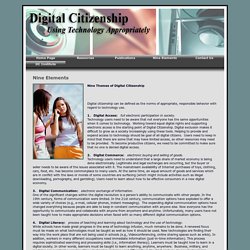
Digital Access: full electronic participation in society. Technology users need to be aware that not everyone has the same opportunities when it comes to technology. 5 Reasons You Should Be Teaching Digital Citizenship. 5 Reasons You Should Be Teaching Digital Citizenship by Paul Barnwell, Teacher of English & Digital Media Students buzzed about the latest uproar on Instagram.
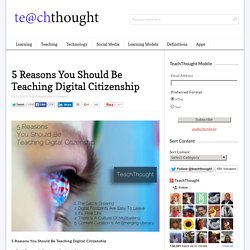
Anonymous sources had posted a “questionable”–and NSFW–list for multiple public schools in our city on Instagram, leading to distraught girls, viral Twitter reactions, and an investigation. This type of cyberbullying and reckless use of digital communication is rampant among teens, but this recent episode was only unusually due to its elevated publicity. Every day, I see a student deficit on how to mindfully employ the unbridled potential and power of their smartphones and other digital tools. Is it those cruel sources who exploit the images? ISTE-Digital-Citizenship-standards-for-allv2. Tips for Safe Internet Use. Reducing the Risks in the Classroom The following guidelines offer general strategies to help teachers reduce the risks associated with students' Internet use.
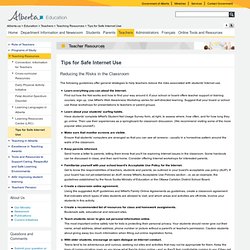
Learn everything you can about the Internet. Find out how the Net works and how to find your way around it. If your school or board offers teacher support or training courses, sign up. Use MNet's Web Awareness Workshop series for self-directed learning. Learning-and-technology-policy-framework-web. BC document on DC. Five-Minute Film Festival: Teaching Digital Citizenship. "Digital citizenship" is an umbrella term that covers a whole host of important issues.
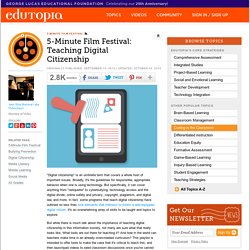
Broadly, it's the guidelines for responsible, appropriate behavior when one is using technology. But specifically, it can cover anything from "netiquette" to cyberbullying; technology access and the digital divide; online safety and privacy; copyright, plagiarism, and digital law, and more. In fact, some programs that teach digital citizenship have outlined no less than nine elements that intersect to inform a well-equipped digital citizen. It's an overwhelming array of skills to be taught and topics to explore. But while there is much talk about the importance of teaching digital citizenship in this information society, not many are sure what that really looks like. Video Playlist: Teaching Digital Citizenship Watch the player below to see the whole playlist, or view it on YouTube.
Digital Citizenship Ribble Final. What is Digital Citizenship? Teaching Screenagers:Character Education for the Digital Age. Our current technological trajectory promises unfathomable, roller-coaster innovation with no braking system.
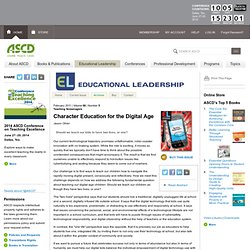
While the ride is exciting, it moves so quickly that we typically don't have time to think about the possible unintended consequences that might accompany it. The result is that we find ourselves unable to effectively respond to hot-button issues like cyberbullying and sexting because they seem to come out of nowhere. Learning to balance Digital Citizenship, Research and Publishing! This article is a reblog from Pippa Davies blog.
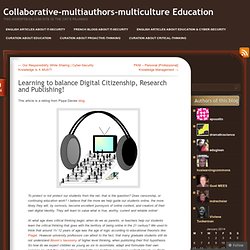
To protect or not protect our students from the net, that is the question? Does censorship, or continuing education work? I believe that the more we help guide our students online, the more likely they will, by osmosis, become excellent purveyors of online content, and creators of their own digital identity. They will learn to value what is true, worthy, current and reliable online! At what age does critical thinking begin; when do we as parents, or teachers help our students learn the critical thinking that goes with the territory of being online in the 21 century?
11 Tips For Students To Manage Their Digital Footprints - 11 Tips For Students To Manage Their Digital Footprints by Justin Boyle If you’ve scratched your head over suggestions to manage your “digital footprint,” you aren’t the only one. A surprisingly large percentage of people have never even heard the phrase, let alone thought about how to manage theirs responsibly. Among students, the percentage is probably higher. We’ll talk about ways you can help students understand and manage their digital footprints before they get themselves in trouble. Digital Citizenship: Resource Roundup.